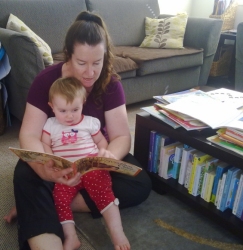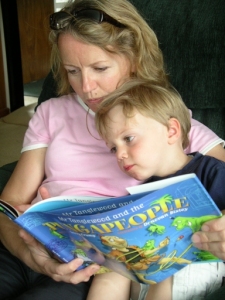Benefits of Early Reading Together®
Summarised
The Early Reading Together® programme:
- Enhances the language and literacy experiences of children and adults. It increases their motivation to read, their enjoyment of reading, their engagement in reading, and the frequency with which they read.
- Helps to build capability, knowledge and confidence among, and relationships between, young children, families/whānau, teachers and librarians.
- Complements and supports the language/literacy education programmes of early childhood services, primary schools and libraries.

Main Benefits
 The benefits of Early Reading Together® have been demonstrated consistently across diverse families, schools, early childhood services and libraries in recent decades. The main benefits include:
The benefits of Early Reading Together® have been demonstrated consistently across diverse families, schools, early childhood services and libraries in recent decades. The main benefits include:
- Children benefit from closer involvement with and more frequent and effective support from parents/whānau.
- They also benefit from a wider variety of enjoyable language/literacy experiences at home.
- Parents from diverse language/literacy, cultural, educational and socio-economic backgrounds learn sound, specific, constructive and enjoyable ways of supporting the language and reading development of their young children. For example: effective ways of interacting with children and encouraging them to participate in stories, rhymes and songs; helping children to talk about and make sense of illustrations, books and other texts.
- Parents gain deeper understandings about ways in which talking with young children and reading to them (from the time they are babies) help a child's language and literacy development.
- Librarians and educators help parents/whānau to access relevant and appealing resources in community and school libraries.
- Parents who struggle with reading become more confident, engaged and competent readers, because they begin to enjoy reading easy, predictable and appealing books with their children, in the non-threatening environment of their own homes.
- Educators, librarians and parents participate in a programme which:
» is practical, user friendly and manageable;
» is relatively low cost for early childhood services, schools and libraries, and free for families;
» strengthens collaboration and relationships between early childhood services, schools, libraries and families;
» has a sound theoretical and research basis;
» has a history of successful implementation throughout New Zealand since 1983. - Families, educators and librarians benefit because Early Reading Together® serves as an effective 'scaffold' between homes, early childhood services and schools, and also homes and libraries. Participation in the programme helps less confident and less engaged families to develop the confidence, awareness, and relationships they (the families) need to take advantage of the educational provisions and libraries in their communities.
- Educators and librarians benefit because they develop deeper understandings about the range of diverse language and literacy practices which children experience within the different social and cultural contexts in which they live and learn. These deeper understandings prompt teachers and librarians to find better ways of building on the varied knowledge and experiences that children bring to more formal educational settings and libraries.
- The work of educators and librarians is supported and enhanced, because Early Reading Together® aligns with the emphasis they place on enjoyment of language and reading and the construction of meaning from a range of good quality print and screen based texts.
- Community libraries provide effective support for early childhood services, schools and families, and reach families who have not previously used libraries.
- A significant benefit of Early Reading Together® stems from the fact that it recognises, values and utilises the expertise and experience within each early childhood service, school and community library. For important educational and financial reasons, the programme is deliberately designed as a low cost, voluntary initiative which can be implemented by keen competent teachers, supported by community librarians (wherever possible). Educators and librarians with the required expertise and experience implement the programme by carefully following the research-based, fully-scripted Early Reading Together®: Workshop Leader's Handbook, and using the programme resources for families as intended. Important relationships and mutual understandings are developed between teachers, librarians and families within and beyond the workshops.
- Teachers and librarians find their involvement satisfying and beneficial professionally, which helps to explain why they continue to run the workshops, usually in their 'spare time' and over and above their existing workloads. They report that they are 'humbled' by the positive responses and gratitude of the families for the support provided.
